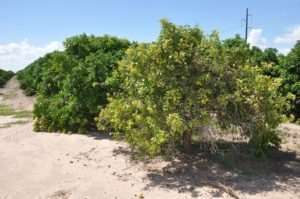Rio Grande Valley citrus growers will vote this month on whether to pool their resources to battle invasive pests and diseases.
Brad Cowan, the Texas A&M AgriLife Extension Service agent in Hidalgo County, said growers will vote on setting up a management zone, approving a maximum assessment rate and electing growers to a board that will represent the management zone.

“AgriLife Extension serves in an educational capacity in this effort,” he said. “Growers are well aware that there are several pests and diseases out there that threaten the citrus industry here. It’s up to them to decide if this is the way they want to collectively address these threats.”
According to the Texas Department of Agriculture, the state agency that administers this referendum, the 2009 Texas Legislature established a non-profit organization, the Texas Citrus Pest and Disease Management Corporation, giving the Commissioner of Agriculture the authority to operate a suppression program to manage and control citrus pests and diseases using an area-wide integrated pest management approach, Cowan said.
The corporation initially was established to work only on citrus greening and its vector, the Asian citrus psyllid. But in 2015, the Texas Legislature, at the request of industry leaders and growers, changed the statute to include all major pests and diseases, he said.
Dale Murden, president of Texas Citrus Mutual in Mission, said if growers vote in favor of proceeding with the suppression program, it would be very similar to the boll weevil eradication program, an effort that has been successful for cotton growers in the Rio Grande Valley and throughout the country.
“Citrus canker, citrus greening, fruit flies and others on the horizon pose a clear danger to citrus production here in the Valley,” Murden said. “Should growers vote to establish the suppression program, it would be run by growers for growers. They would decide which threat to tackle as they see fit.”
Jon Dale, corporation program director in Mission, said growers will receive ballots based on county appraisal district records.
“If you grow citrus and have an agricultural exemption on properties where citrus is grown in Cameron, Hidalgo and/or Willacy counties, you will receive a ballot by Oct. 12 mailed to the address listed on your tax records,” he said. “Voting begins on Oct. 12, and all ballots are due back to the Texas Department of Agriculture postmarked by Oct. 24.”
Dale said growers who do not receive a ballot but feel they are qualified to vote may request a ballot by calling 956-580-8004, or pick up a ballot at AgriLife Extension offices in Edinburg, San Benito and Raymondville.
Murden said growers can activate the suppression program if ballots in favor total a two-thirds majority or if growers voting in favor represent 50 percent of the total citrus acreage.
Click here to see more...